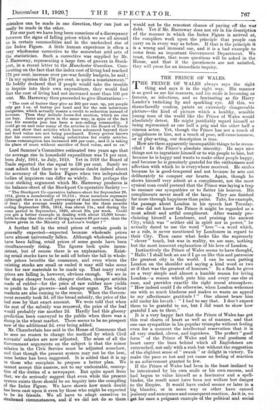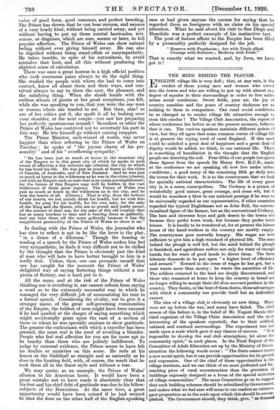THE PRINCE OF WALES.
THE PRINCE OF WALES always says the right thing and says it in the right way. His manner is as good as are his manners, and his smile is becoming as famous, as infectious, and as fascinating as Sir Harry Lauder's twitching lip and sparkling eye. All this, we shamefacedly confess, paints an extremely disagreeable picture—the kind of picture which a healthy, sensible young man of the world like the Prince of Wales would absolutely detest. He might justifiably regard himself as being represented as one half a prig and the ether half a cinema actor. Yet, though the Prince has not a touch of priggishness in him, not a touch of pose, self-consciousness, or of play-acting, our description is true. How are these apparently incompatible things to be recon- ciled? In the Prince's absolute sincerity. He says nice things not to ingratiate himself or to win people to him, but because he is happy and wants to make other people happy, and because he is genuinely grateful for the enthusiasm and affection with which he is everywhere received. He smiles because he is good-tempered and not because he sets out deliberately to conquer our hearts. Again, though he shows himself very adroit at a compliment, not the most cynical man could pretend that the Prince was laying a trap to ensnare our sympathies or to flatter his hearers. His compliments never smell of the lamp. They are finished far more through happiness than pains. Take, for example, the passage about London in his speech last Tuesday. If one did not know the Prince it might be regarded as a most adroit and artful compliment. After warmly pro- claiming himself a Londoner, and praising the ancient City, which was "neither old in spirit nor in power," he actually dared to use the word love "—a word Which, as a rule, is never mentioned by Londoners in regard to their City. Then came what looks like the supremely " clever ' touch, but was in reality, we are sure, nothing but the most innocent explanation of his love of London. - Instinctively the Prince of Wales seems to have thought, " Hallo ! I shall look an ass if I go on like this and patronize the greatest city in the world. I can be seen patting London on the shoulder and saying a kind word or two as if that was the greatest of honours." In a flash he gives us a very simple and almost a humble reason for loving London—a reason which puts him and every one else at ease, and provides exactly the right moral atmosphere. "How indeed could I do otherwise, when London welcomes me with so much kindness and makes so warm an appeal to my affectionate gratitude ? " One almost hears him add under his breath : "I had to say that. I don't expect them to be grateful to me, but I did want to show how grateful I am to them." It is a very happy fact that the Prince of Wales has got this real charm of heart as well as of manner, and that one can sympathize in his popular triumphs without feeling even for a moment the intellectual reservation that it in all very studied, clever, and ingenious. The perfect "good form" of the Prince of Wales and his real goodness of heart carry the lines behind which all Englishmen are entrenched, not only with a rush but without the suggestion of the slightest sense of" swank" or delight .in victory. To make the pace so hot and yet cause no feeling of reaction is an achievement granted to few. If the Prince of Wales; had been in the least inclined to be intoxicated by his own smile or his own success, and had begun to value himself as a fascinator and a spell- binder, the result must have been not welfare but danger to the Empire. It would have ended sooner or later in a big blunder, or in some way or other have caused jealousy and annoyance and consequent reaction. As it is, we value of good form, good manners, and perfect breeding. The Prince has shown that he can bear success, and success of a very heady kind, without being carried away, and yet without having to put up those mental barricades, reti- cences, or disguises, which are sure, sooner or later, to kill popular affection. The Prince of Wales can show natural feeling without ever, giving himself away. He can also be dignified without -being stand-offish or unsympathetic. He takes trouble, in spite of his naturalness, to avoid mistakes that hurt, and all this without producing the slightest sense of calculation. There was once a great hostess in a high official position who took • enormous pains always to do the right thing. She studied the people with whom she had to come into contact, knew all about them and their ways, and con- trived always to say to them the easy, the pleasant, and the satisfying thing. When she shook hands with the endless stream of guests at her great receptions, you felt, while she was speaking to you, that you were the one man or woman whom she wanted to see. But then alas ! as one of her critics put she spoilt it all by looking over your shoulder, at the next couple—you saw her preparing her perfectly spontaneous remark ! Somehow or other the Prince of Wales has contrived not to overstudy his part in this way. He lets himself go without coming croppers.
The Prime Minister, arch-wizard of words, was never happier than when referring to the Prince of Wales on Tuesday ; he spoke of the joyous charm of his per- sonality" and of his "overflowing sympathy."
"He has been just as much at home in the remotest city of the Empire as in this great city of which he spoke in such terms of affection a few minutes ago (cheers), the city in which he has lived his life. He was just as much at home in the cities of Canada, of Australia, and of New Zealand. And he was just as much at home in the wilderness as he was in the cities (cheers), end with an Empire such as ours that is no mean accomplisluxient, for the future of this Empire may well lie hidden in the vast wilderness of those great regions. The Prince of Wales was just as much at home in the wilderness as in the city, and he won the hearts of all. (Cheers.) That is why, from the bottom of our hearts, we not merely drink his health, but we wish him health, we pray for his health, for his own sake, for the sake of the King and the Queen, who are so proud, and justly proud, of the success of their son, for the sake of this old country that has so many burdens to bear and is bearing them so gallantly, and can bear them all the more gallantly because it has the magnificent personality of the Prince of Wales to cheer it on."
In dealing with the Prince of Wales, the journalist who has time to reflect is apt to be like the lover in the play, "in a deuce of a dilemma." Though the hearing or reading of a speech by the Prince of Wales makes him feel very sympathetic, he finds it very difficult not to be chilled by the thought that the Prince is obviously just the kind of man who will hate to have butter brought to him in a lordly dish. Unless, then, one can persuade oneself that one has caught for the moment the Prince of Wales' delightful way of saying flattering things without a sus- picion of flattery, one is hard put to it.
All the same, and at the risk of the Prince of Wales thinking one is overdoing it, one cannot refrain from saying a word as to the extremely successful way in which he managed the very difficult job of summarizing his tour in a formal speech. Considering the rivalry, not to give it a stronger name, of the great self-governing communities of the Empire, the boldest of men might have been excused if he had quailed at the danger of saying something which might accidentally grate upon the ears of a section of those to whom he was specially anxious to show gratitude. The greater the enthusiasm with which a traveller has been greeted, the more real is the need of avoiding a blunder. People who feel real affection for you are far more apt to be touchy than those who are politely indifferent. To judge by external evidence, the Prince seems to have felt no doubts or anxieties on this score. He rode at his fences at the Guildhall as straight and as naturally as he does in the hunting field, with, of course, the result that he took them all in the finest style and without a toss.
We may quote, as an example, the Prince of Wales' allusion to his American hosts. It would have been a great mistake not to have made it absolutely clear that Ins first and his chief debt of gratitude was due to his fellow- subjects of the Dominions. At the same time, a great opportunity would have been missed if he had seemed to shut the door on the other half of the English-speaking race or had given anyone the excuse for saying that he regarded them as foreigners with no claim on his special attention. What he said about his visit to San Diego and Honolulu was a perfect example of his instinctive tact. The post of liaison officer to the Empire has been filled by a personality perfectly designed for the job.
"Reserve with Frankness; Art with Truth allied. Courage with Softness ; Modesty with Pride."
That is exactly what we wanted, and, by Jove, we have got it !











































 Previous page
Previous page